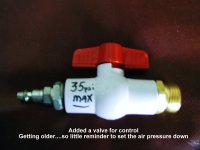Dale Smith
Active Member
I have made up a attachment device for the fresh water inlet with an air compressor fitting on the other end. I have set my air compressor to a low pressure level (25 pounds) and have blown out all of my water lines by opening each faucet one at a time. I have also held open the toilet valve to allow any water to be blown out of there as well. I have gone around to each of the faucets and done this process twice over.
Before I started this process. I bypassed the water heater and pulled the anode rod out, draining the water heater
Is there any method of removing any residue from the bottom of the hot water tank, prior to me installing a new anode rod?
In the middle of November,we are taking the trailer from the cold climate of Ontario, Canada, down to Memphis, Tennessee, where we will stay for a week or two, and then winterize the trailer with antifreeze prior to putting it into storage at this facility, until after Christmas when we will return to the trailer and continue our journey south.
I am trusting that my process of blowing out all the lines will be enough for this time of year, until we do a full winterize at the end of our stay in Tennessee? Is my thought of doing a full winterize in Tennessee overkill for that area?
I am looking for any advice on anything I may have overlooked.
It will be helpful to bounce this off of the forum and get any feedback that would be helpful.
Much appreciated.
Before I started this process. I bypassed the water heater and pulled the anode rod out, draining the water heater
Is there any method of removing any residue from the bottom of the hot water tank, prior to me installing a new anode rod?
In the middle of November,we are taking the trailer from the cold climate of Ontario, Canada, down to Memphis, Tennessee, where we will stay for a week or two, and then winterize the trailer with antifreeze prior to putting it into storage at this facility, until after Christmas when we will return to the trailer and continue our journey south.
I am trusting that my process of blowing out all the lines will be enough for this time of year, until we do a full winterize at the end of our stay in Tennessee? Is my thought of doing a full winterize in Tennessee overkill for that area?
I am looking for any advice on anything I may have overlooked.
It will be helpful to bounce this off of the forum and get any feedback that would be helpful.
Much appreciated.

